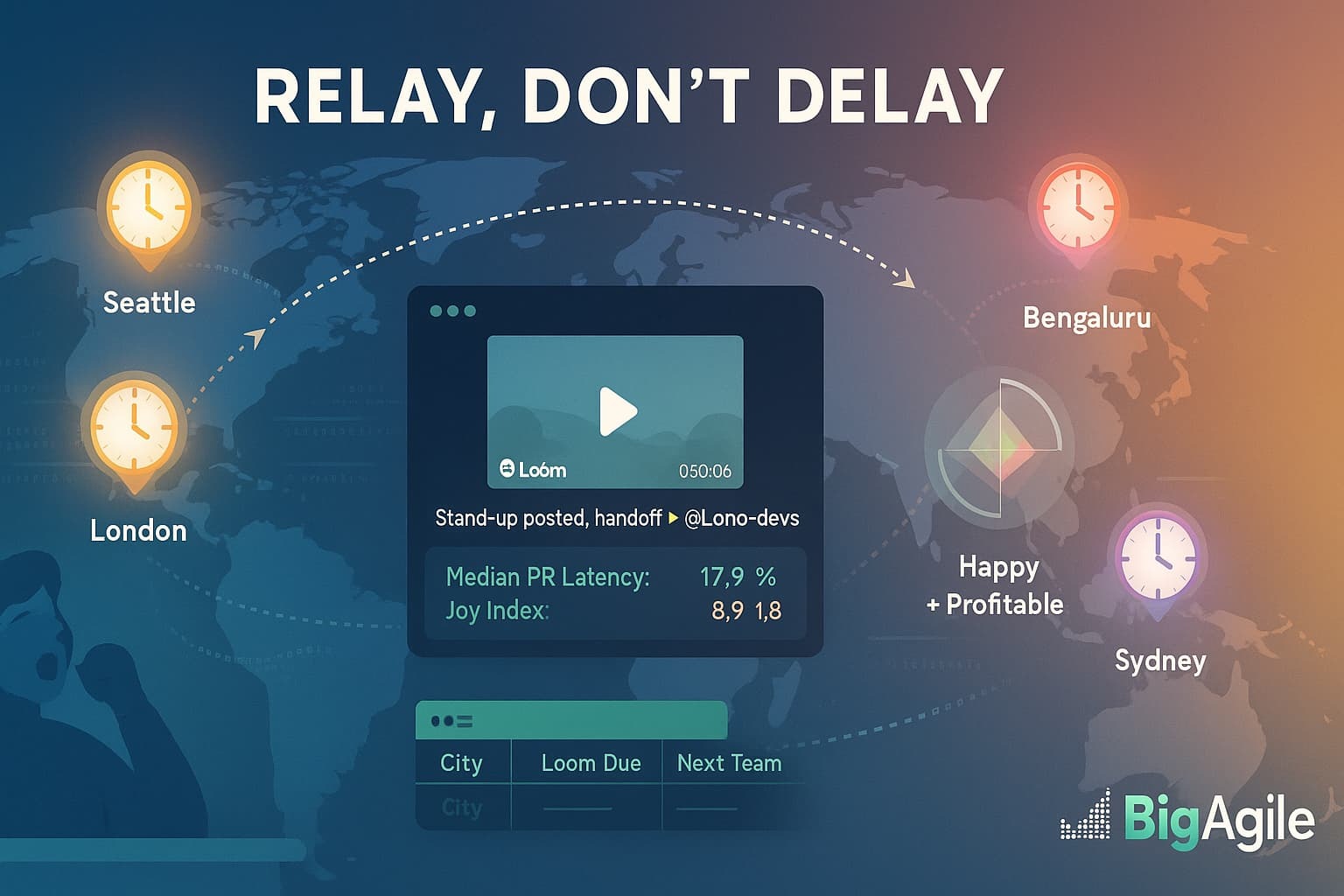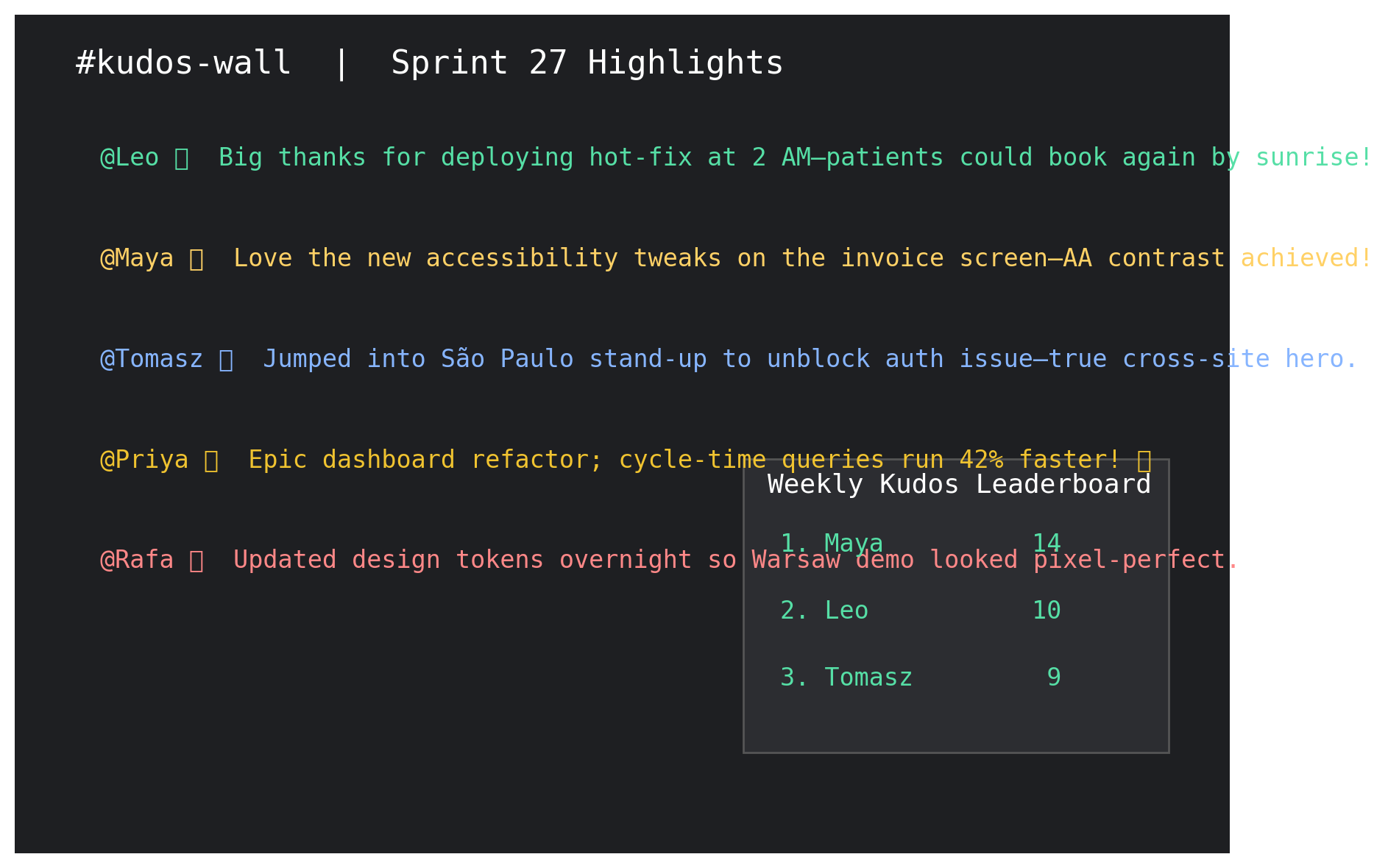
- Remote? Multilingual? Empathy is still your fastest protocol.
Monday, we focused on psychological safety, the oxygen that allows Agile teams to breathe. But safety alone doesn’t move work across oceans and languages. In a world where your front-end is in São Paulo, your API in Warsaw, and your product owner in Austin, trust must travel as far as your VPN does. No amount of tacos at a local team lunch can build rapport across twelve time zones; empathy needs to ride the "fiber".
Today, let’s explore “swift trust,” a term Lyssa Adkins (Coaching Agile Teams) uses to describe the quick, lightweight confidence remote teammates need before they’ve even shared a single sprint room. Atlassian’s State of Teams 2025 makes the stakes clear: distributed squads with high trust spend 25% less time redoing work that was misunderstood. That’s a full day back every week, without needing another automation script or burn-down adjustment.
We’ll explore three empathy rituals:
- Camera-Off Empathy Mapping
- Culture-Swap Demo Day
- Asynchronous Kudos Wall
These techniques transform cultural differences into sources of creative energy rather than obstacles. These practices require minutes, not budget, and can scale from two people on Slack to multi-continent fintech programs.
Along the way, we’ll show how a "tri-city" payments team reduced misalignment rework by 38% in two quarters by simply institutionalizing gratitude and role-swap demos.
This post fits perfectly within our “Agile with Heart” series: Monday showed that fearless voices increase velocity; Tuesday demonstrates that remote empathy maintains that velocity when work spreads across the globe. Wednesday, we’ll broaden the focus to individual “human skills” that enhance frameworks, but for now, let’s build trust at lightning speed, no tacos needed.
Why Distributed Trust Matters.
Atlassian’s State of Teams 2025 survey of 12,000 knowledge workers found top-performing remote teams spend 25% less time re-doing misunderstood work and the delta is explained by trust, not tooling.
When teammates believe good intent travels faster than time-zones, they ask clarifying questions early, commit code confidently, and escalate blockers while they’re still cheap.
Three Rituals To Build Swift Trust
| Ritual | How It Works | Why It Helps |
|---|---|---|
| Camera-Off Empathy Mapping | Once per sprint a volunteer describes a thorny user story; everyone else turns cameras off and listens for 2 min, then posts emojis + one-line feelings in chat. | Removes visual bias, amplifies shy voices, and surfaces hidden assumptions. GitLab credits similar exercises for a 78% engagement score. |
| Culture-Swap Demo Day | Rotate sprint demos by office: São Paulo presents Warsaw’s feature, Warsaw demos Austin’s, translating comments and idioms as they go. | Teams “walk a kilometer in each other’s JavaScript,” exposing locale quirks and boosting cross-site empathy before users ever see the product. |
| Asynchronous Kudos Wall | Slack channel #kudos-wall logs thank-yous; a bot posts a weekly leaderboard and highlights top collaboration moments. | Public recognition lifts psychological safety; Atlassian data ties kudos frequency to a 12% drop in mis-alignment rework. |
Field Proof.
A payments startup spanning São Paulo ↔ Warsaw ↔ Austin conducted all three rituals for two quarters. Story misalignment rework measured as tickets reopened after “Done” decreased by 38%, and lead time dropped from 9.2 to 7.1 days.
Engineers mentioned the Kudos Wall as “social glue” and the Culture-Swap Demo as “seeing code through another accent.”

How to Start.
- Spin up #kudos-wall; seed the first three thank-yous yourself.
- Schedule a 30-min Camera-Off Empathy Map during retro; use Miro or FigJam for emoji drops.
- Pick next demo host city; give them a buddy in the receiving city for context.
- Measure rework tickets and stand-up blocker counts as leading indicators.
Early signals of success: chat threads lengthen with curiosity rather than defense, blockers surface a day sooner, and emoji traffic tilts from 😬 to 😄.
What Next?
Trust is the lubricant that keeps your distributed engine running smoothly as the miles accumulate. Swapping demos, silent-first empathy maps, and a scrolling wall of gratitude cost almost nothing, yet they pay off in saved hours, clearer hand-offs, and an energy that spreads faster than video lag. When São Paulo knows Warsaw has its back before the stand-up even begins, velocity isn’t just maintained, it multiplies.
Tomorrow, we’ll add the micro-skills that make those rituals effective, active listening, radical candor, and inclusive decision-making. Remember, the work of people is where the true progress is made.